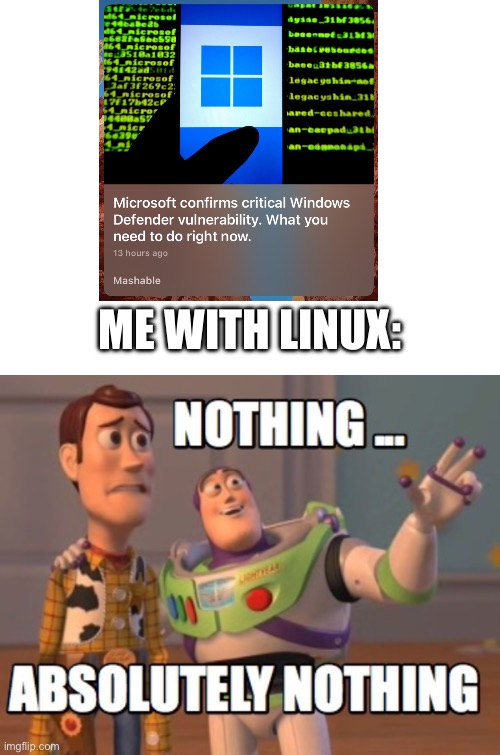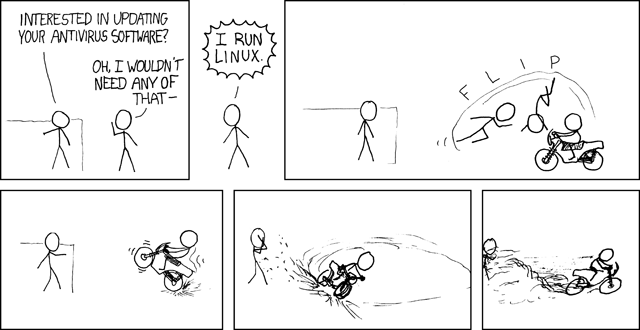Same for people using windows 7
linuxmemes
Hint: :q!
Sister communities:
Community rules (click to expand)
1. Follow the site-wide rules
- Instance-wide TOS: https://legal.lemmy.world/tos/
- Lemmy code of conduct: https://join-lemmy.org/docs/code_of_conduct.html
2. Be civil
- Understand the difference between a joke and an insult.
- Do not harrass or attack members of the community for any reason.
- Leave remarks of "peasantry" to the PCMR community. If you dislike an OS/service/application, attack the thing you dislike, not the individuals who use it. Some people may not have a choice.
- Bigotry will not be tolerated.
- These rules are somewhat loosened when the subject is a public figure. Still, do not attack their person or incite harrassment.
3. Post Linux-related content
- Including Unix and BSD.
- Non-Linux content is acceptable as long as it makes a reference to Linux. For example, the poorly made mockery of
sudoin Windows. - No porn. Even if you watch it on a Linux machine.
4. No recent reposts
- Everybody uses Arch btw, can't quit Vim, and wants to interject for a moment. You can stop now.
Please report posts and comments that break these rules!
Important: never execute code or follow advice that you don't understand or can't verify, especially here. The word of the day is credibility. This is a meme community -- even the most helpful comments might just be shitposts that can damage your system. Be aware, be smart, don't fork-bomb your computer.
Regardless of us using Linux on our home computers, most businesses and services use Windows machines. Your information is likely still stored on Windows machines elsewhere if you interact with the world at all.
With that in mind, it's worth being aware of Windows security problems when they come up.
Got it, stop interacting with the world
I was already mostly doing this so
What would we do when these happen? What could we do in the moment to change anything?
Join an eventual class action?
That's the big "what if" that hangs over everything isn't it?
Taking the internet into consideration, I would doubt "most".
You'd be surprised. For medical info a lot of that is going to be sorted in windows servers running as either file or sql servers.

If you think being on Linux makes you immune for attacks, I have bad news for you.
there are much less vulrenabilities on Linux. No system is totally unpenetrable, but having 2-5 vulrebabilities is always better than having 30-40
I've got a link for you to click, Mr super secure OS user. I promise your OS will protect you.
Jokes on you, dude is rocking Qubes /s
Here I have a cool program to install. Just pipe this link into bash really quick...
With sudo. Can't forget that or it won't work.
Do it
Realistically the difference is in how Linux mitigates the common vectors for attack that Windows doesn't. Most malware targeting individual workstations gets in by either supply chain attack, vulnerable web renderer or by tricking the user into installing it.
Centralized repositories with centralized build tooling limits opportunities for supply chain attacks, plus helps prevent users from accidentally downloading a Trojan when trying to grab other software. Containerizing web applications helps limit browser exploits, and less "features" phoning home means a default incoming-deny firewall policy will largely prevent most vulnerabilities from being remotely serious.
So for an individual workstation, Linux is significantly safer from viruses. In the enterprise it's a completely different story where the threat environment does require defense in depth regardless of your choices of vendors
It probably makes you a less likely target though. I suppose that bots scan for known Widows vulnerabilities simply because that platform has a much higher market share among desktop operating systems. Besides, Linux distros offer a unified way to update all your software. On Windows, third-party software is often installed and maintained manually.
The way I have always liked to put it specifically is that Linux is not inherently more secure than windows. However Linux is inherently easier to secure than Windows. Namespaces, apparmor, seccomp-bpf, and a very fine grain limited vs super user permission system. Just to name a few top level things.
The tools are all there on basically any system, very well documented, relatively easy to use. And once you set them up they will not randomly change things on you. I say this as a system administrator having to deal with Windows constantly where Microsoft decides that they are smarter than you and fuck your group policy edits because we put out this update and we think this option is better so we're going to revert like half the shit you did. Over half my fucking job and security is just checking what did Microsoft fuck up about my security set up with this update, and trying to rotate through security vendor 2094726 to fill in the absolute basic security processes that windows doesn't provide
Sometimes Mint tells me there are security updates available. Happened just this morning. Updating makes me feel good :)
And I can do it wherever I want. And my work is in no way interrupted, while the updates go through.
And it had the Edge of not installing Candy Crush
And put edge back in the taskbar.....
People here running *nix OSes while I run a Nix*OS
I mean... a form of Microsoft Defender is available for Linux, but only for enterprise customers if I remember correctly 😅
Yep, my company allows me to use Linux but for Compliance Reasons I need to have Microsoft Defender installed and running. Still beats Windows 11 by a mile
and it will suck your servers dry.
Eh, it's not too bad when properly configured.
Is not having an anti-virus good for most people though?
most antivirus apps are very invasive, heavy on resources and even spy on you. Windows defender is usually enough. However, virustotal is still recommended
Is this something that someone who doesn't have tech as a hobby cares enough about to change they're os?
I would say yes? Many if my friends in uni were using laptops that had McAfee built in. I'm not exaggerating when I say they were unusable. I removed that shit and those machines were snappy af.
On one side, if you have a brain you're fine.
On the other side, *glances at general public typing google.com into google* ...yeah
Anti-virus is not going to stop you from stupidity. You classic "Anti-virus" won't stop anything more than run of the mill simple stuff.
Most of the time that's what people need an antivirus for, most attacks the average person will suffer will be some script that's easily caught by the antivirus.
If the script doesn't have permission to do anything it doesn't matter. See Android as an example.
there is an update, i applied it at the weekend

